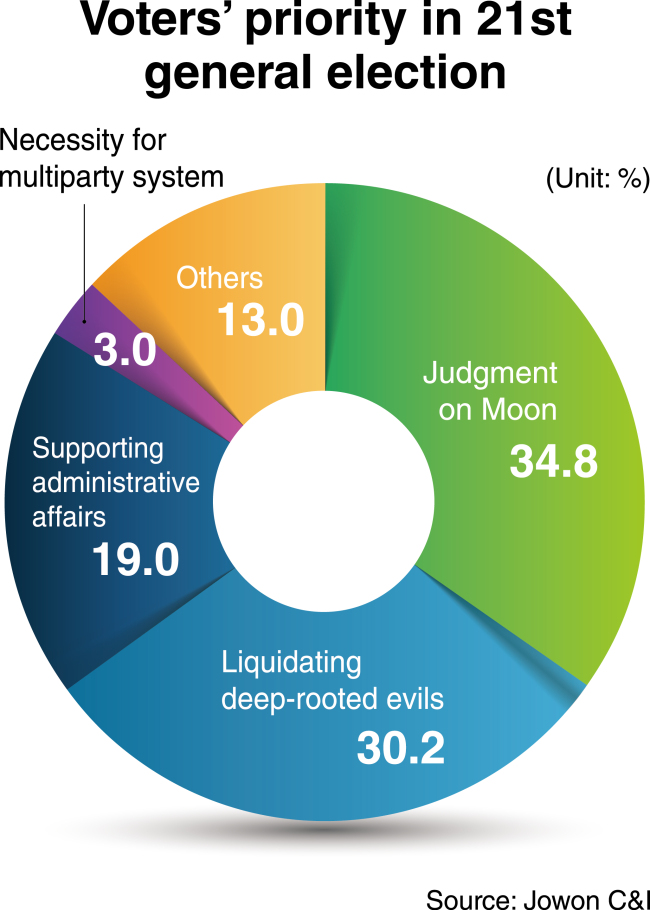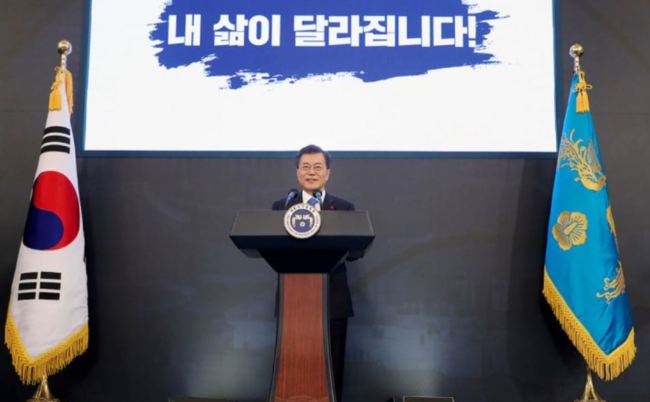[News Focus] Voters split on support for anticorruption efforts vs. desire to punish Moon: survey
By Kim Yon-sePublished : April 23, 2019 - 15:43
SEJONG -- The next president of South Korea will be elected in 35 months, on March 9, 2022, two months prior to the end of incumbent President Moon Jae-in’s term.
But before then, the Moon government faces a turning point with the upcoming general election. With Moon now 40 percent of the way through his five-year tenure, it is the parliamentary election slated for April 15 next year that will likely determine how he fares during the remainder of his term.
But before then, the Moon government faces a turning point with the upcoming general election. With Moon now 40 percent of the way through his five-year tenure, it is the parliamentary election slated for April 15 next year that will likely determine how he fares during the remainder of his term.

A crushing defeat for the ruling Democratic Party of Korea could instantly turn Moon into a lame duck, as history clearly shows.
To avoid that outcome, the Democratic Party is mapping out strategies to win seats in constituencies nationwide where competition will be especially cutthroat.
Many experts say the fiercest showdowns between the ruling party and the main opposition Liberty Korea Party are likely to occur in Seoul, Gyeonggi Province, Incheon, Busan, Ulsan and South Gyeongsang Province. Collectively, those regions are home to 33.8 million residents and comprise 65.2 percent of the country’s population.
“A core issue for the rival parties is whether they will score victories in the Seoul and Busan metropolitan areas,” said a political analyst in Sejong City.
A poll conducted by Jowon C&I and Kukinews, which surveyed 1,000 people and released the results April 18, showed that the ruling party remained ahead of the main opposition with a nationwide approval rating of 38.4 percent vs. the opposition’s 30 percent.
In Seoul, the Democratic Party was even further ahead of the Liberty Korea Party with an approval rating of 39.2 percent vs. 29.5 percent. For Gyeonggi Province and Incheon combined, the respective figures stood at 37.9 percent and 25.5 percent.
But in Busan, Ulsan and South Gyeongsang Province, the main opposition was found to have overtaken the ruling party with an approval rating of 37.6 percent vs. 35.5 percent for all three areas combined.
The pollsters also asked the respondents what their priorities would be when they cast their ballots in the 2020 general election. They were asked to choose from a preset list.
The highest percentage of respondents -- 34.8 percent -- viewed the election as a chance to cast judgment on the incumbent government, or impose punishment on it. Next, at 30.2 percent, were those who wanted to support the government in completing its task of eliminating deeply rooted corruption and other misconduct by those in power.
About 19 percent of respondents said their priority was to elect legislators who would ensure smooth administrative affairs during the latter part of Moon’s term.
The anti-Moon response -- indicating that the incumbent government should be subject to judgment or punishment -- was most frequent among residents of Daegu and North Gyeongsang Province at 41.0 percent. It occurred next most frequently among respondents from Busan, Ulsan and South Gyeongsang at 38.2 percent; those from Seoul at 38.1 percent; and those from Gyeonggi Province and Incheon at 33.9 percent.
Residents of Gwangju and the Jeolla region topped the list for the pro-Moon answer with 42.4 percent -- that is, their priority was the elimination of deeply rooted corruption and other misconduct by those in power. In contrast, only 34.1 percent of respondents from Seoul gave the same answer. For those from Daejeon, Sejong and South Chungcheong Province, the figure was 33.7 percent.
When the results were broken down by gender, 39 percent of men and 30.6 percent of women chose punishing the Moon administration as their top priority. Another 30.8 percent of men and 29.6 percent of women chose rooting out corruption.
The results also reflected generational differences, with 40.6 percent of respondents aged 60 and older selecting the anti-Moon answer. Respondents in their 40s were next, with 36.4 percent giving the anti-Moon answer, followed by those in their 50s with 33.9 percent.

When asked what factors would most affect the outcome of the election, 56.2 percent of respondents picked economic affairs. This answer was followed by “diplomatic-unification affairs” with 15.1 percent, social reforms with 11.6 percent and social welfare with 6.5 percent.
Economic affairs were cited most frequently by Seoul residents, with 65.1 percent choosing this answer. Next, at 63.6 percent, were residents of Busan, Ulsan and South Gyeongsang Province. In contrast, only 42.9 of residents of Gwangju, the Jeolla region, Gangwon Province and Jeju Island selected this answer.
Meanwhile, another poll conducted by Gallup Korea, which released the results April 20, showed that President Moon’s approval ratings came to 50 percent in Seoul, 48 percent in Gyeonggi Province and Incheon and 44 percent in Busan, Ulsan and South Gyeongsang Province.
Nationwide, 48 percent of Koreans expressed their support for Moon -- 45 percent of men and 50 percent of women.
The Gallup survey also indicated that support for the Democratic Party had dropped 6 percentage points in six months, from 45 percent in the third week of October 2018 to 39 percent in the third week of April 2019.
Conversely, the Liberty Korea Party’s approval rating climbed from 13 percent to 20 percent over the corresponding period.
By Kim Yon-se (kys@heraldcorp.com)







![[Graphic News] More Koreans say they plan long-distance trips this year](http://res.heraldm.com/phpwas/restmb_idxmake.php?idx=644&simg=/content/image/2024/04/17/20240417050828_0.gif&u=)
![[KH Explains] Hyundai's full hybrid edge to pay off amid slow transition to pure EVs](http://res.heraldm.com/phpwas/restmb_idxmake.php?idx=644&simg=/content/image/2024/04/18/20240418050645_0.jpg&u=20240419100350)





![[From the Scene] Monks, Buddhists hail return of remains of Buddhas](http://res.heraldm.com/phpwas/restmb_idxmake.php?idx=652&simg=/content/image/2024/04/19/20240419050617_0.jpg&u=20240419175937)

![[KH Explains] Hyundai's full hybrid edge to pay off amid slow transition to pure EVs](http://res.heraldm.com/phpwas/restmb_idxmake.php?idx=652&simg=/content/image/2024/04/18/20240418050645_0.jpg&u=20240419100350)

![[Today’s K-pop] Illit drops debut single remix](http://res.heraldm.com/phpwas/restmb_idxmake.php?idx=642&simg=/content/image/2024/04/19/20240419050612_0.jpg&u=)